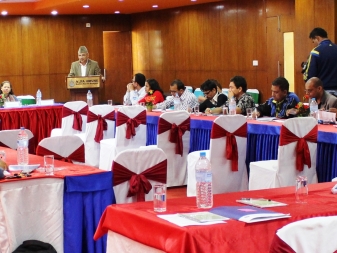Butwal: Speaking at a discussion programme on the Technical Vocational Education and Training (TVET) Policy 2012 jointly organized by the Ministry of Education and UNDP's Support to Knowledge and Lifelong Learning Skills (SKILLS) Programme at the Butwal Chamber of Commerce and Industry in Butwal on 19 June, TVET stakeholders said that most of the technical/vocational trainings that are currently operational in the country are too city-centric, making it very difficult for youths living in rural and remote areas to gain access to them. "This deprives them of an important opportunity that could help enhance the quality of their life," one of the participants said.
According to stakeholders, while on one hand, the skilled workforce produced by technical institutes in the country has not been able to get jobs, on the other, the local industries and businessmen are not getting the kind of skilled manpower they are looking for to help them grow their businesses.
"This situation shows that there is clear mismatch between the skilled manpower supplied by the country's technical institutes and the actual workforce demanded by market," said Mahesh Man Singh, President of BCCI, adding that this has happened because the vocational trainings provided in the country are not market-responsive.
During the discussion, participants also advised the government to ensure that students graduating from schools with technical subjects are later able to pursue higher education in their chosen fields. Similarly, they suggested that all technical trainings should be provided through a one-door mechanism, i.e. there should be uniform standards in designing and administering the training programs being offered by various government, private and non-government agencies.
The policy discussion programme was moderated by TVET experts Dr. Hari Pradhan, Janardan Nepal and Mahashram Sharma assigned by UNDP. Informing that they have been organizing such policy dialogue events across the country to solicit feedbacks from the concerned stakeholders to ascertain gaps in the existing TVET policy so as to help the government to review the same, they said that only when vocational and technical trainings are conducted in the country by focusing on the actual needs of the country and its market would such programs be successful.

